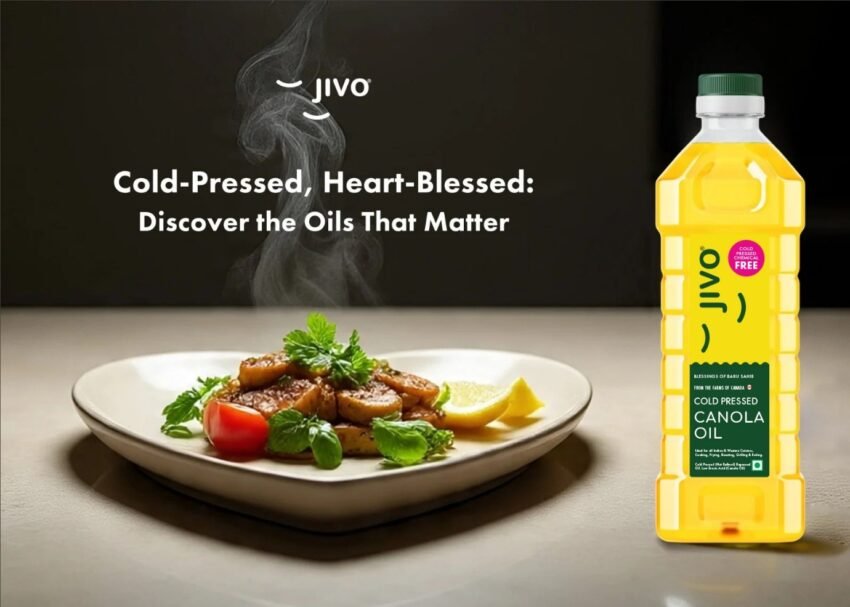Cooking and cooking oil both play a crucial role in our daily lives. Our bodies require oils and fats, though in small amounts, as they carry essential vitamins, fatty acids, and other nutrients vital for overall health. Many people consider fats to be unhealthy and associate them with obesity, weight gain, and heart problems. However, this isn’t entirely true. Healthy fats in cooking oils, especially when cold-pressed, can benefit health in numerous ways, particularly by supporting heart health.
There are many types of cooking oils available in the market, but not all are equal in terms of health benefits. Almost every brand claims its oil is healthy, but the reality often differs after long-term consumption. So, let’s explore what truly makes a cooking oil healthy.
Types of Fats
If you are acquainted with cooking oils, you must have come across the terms ‘good’ and ‘bad’ fats. These terms generally refer to the types of fats present in oils: monounsaturated fats (MUFA) and polyunsaturated fats (PUFA), which are found in healthier cooking oils. When present in the right proportions and consumed in moderation, these fats can help improve both the taste and overall health benefits of food.
Monounsaturated Fatty Acids
MUFA stands for monounsaturated fatty acids. These are a type of healthy fat found in many plant-based oils, nuts, seeds, and some animal products. The most common MUFA is oleic acid, which is especially abundant in oils like olive, canola, and peanut oil. Monounsaturated fats are considered good fats because they can help lower bad cholesterol (LDL) levels and may reduce the risk of heart disease when they replace saturated and trans fats in the diet. MUFAs also provide essential nutrients to help develop and maintain your body’s cells. MUFAs are not only heart-healthy, but they also make cooking oils more stable at high temperatures. This means oils high in MUFA are less likely to break down and produce harmful compounds when heated, making them a better choice for frying, sautéing, and baking. The Mediterranean diet, known for its health benefits, is rich in MUFA thanks to its high use of olive oil and nuts. For optimal health, it’s good to choose the best cooking oils in India, Jivo cold-pressed cooking oils, where MUFA makes up a significant portion of the fat content. Many nutrition experts recommend oils with at least 50% or more MUFA for regular use.
Oils rich in MUFA include:
- Olive oil (about 68–73% MUFA)
- Canola oil (about 62% MUFA)
- Peanut oil (about 49–71% MUFA)
- Almond oil (about 67% MUFA)
- Avocado oil (about 74% MUFA)
Polyunsaturated Fats
PUFA stands for polyunsaturated fatty acids. These are a type of healthy fat found mostly in plant-based oils, nuts, seeds, and fatty fish. Chemically, polyunsaturated fats have more than one double bond in their structure, making them liquid at room temperature but sometimes turning solid when chilled. The two main types of PUFA are omega-3 and omega-6 fatty acids, both of which are essential, which your body cannot make them, so you must get them from your diet. Polyunsaturated fats are packed with health beneficial properties, known to lower bad cholesterol (LDL) levels, which reduces the risk of heart disease and stroke. PUFA also provide essential nutrients for building and maintaining your body’s cells. They are a source of vitamin E, a powerful antioxidant that protects your cells. PUFA support brain function, hormone production, and cell growth. Replacing PUFA with less healthy fats (like saturated and trans fats) may help improve your cholesterol profile and support heart health. Oils high in PUFA, such as sunflower, soybean, corn, and grapeseed oil, are versatile for salad dressings, baking, and low-to-medium heat cooking. Remember, moderation is key, and it’s best to use PUFA-rich oils in place of saturated and trans fats for the greatest health benefit. When choosing the best cooking oils in India, look for those where PUFA make up a significant portion of the fat content. Jivo’s best cold-pressed oils offer a natural source of PUFA, carefully balanced and minimally processed to give you the health benefits your body needs, in the right amount.
Oils High in PUFA
- Safflower oil: about 74–78% PUFA
- Sunflower oil: about 66–69% PUFA
- Corn oil: about 59–60% PUFA
- Soybean oil: about 37–61% PUFA
- Walnut oil: about 67% PUFA
- Grapeseed oil: about 75% PUFA
- Sesame oil: about 43% PUFA
- Canola oil: about 29–35% PUFA
Saturated and Trans Fats
Saturated and trans fats are two types of fats commonly found in cooking oils, but both are linked to negative health effects when consumed in excess. Saturated fats are solid at room temperature and are found naturally in animal products like butter, ghee, lard, and also in some plant oils such as coconut oil and palm oil. Diets high in saturated fats can raise LDL (Bad) cholesterol levels, increasing the risk of heart disease. On the other hand, trans fats are mostly artificially created through hydrogenation, a process that turns liquid oils into solid fats. These hydrogenated oils can also form additional unhealthy compounds when heated repeatedly at high temperatures, such as during deep-frying. Trans fats raise LDL (Bad) cholesterol and lower HDL (Good) cholesterol, increasing the risk of heart disease, stroke, and type 2 diabetes. Even small amounts can be harmful; for every 2% of calories from trans fat, heart disease risk rises by 23%.
Saturated and trans fats in cooking oils are linked to higher risks of heart disease and other health issues. Trans fats, in particular, are considered the most harmful and should be avoided entirely. Always check labels for saturated and trans fat content, avoid partially hydrogenated oils, and choose the best cooking oils in India that are liquid at room temperature for better heart health.
Choose the Best and Healthy Cooking Oil in India
If you are looking for the best cooking oil in India, which contains healthy monounsaturated and polyunsaturated fats, is low in saturated fats, and has zero trans fat, consider trying Jivo’s cold-pressed Canola Oil.
Why Jivo Cold Pressed Canola Oil is Better
Rich in Healthy Fats: Jivo Cold Pressed Canola Oil is high in monounsaturated (Good) fats (MUFA), which are linked to improved cholesterol levels and heart health. Canola oil also offers a significant amount of polyunsaturated fats (PUFA), including a balanced ratio of omega-3 and omega-6 fatty acids, both essential for brain and cell health.
Lowest Saturated Fat: Jivo Cold Pressed Canola Oil contains the lowest amount of saturated (“bad”) fats among all vegetable oils, which is important for reducing the risk of heart disease and supporting cardiovascular health.
Cold Pressed for Nutrient Retention: The cold-press extraction method preserves flavor and nutrients, ensuring you get the maximum health benefits without chemical residues.
Balanced Omega-3 and Omega-6: The oil provides an optimal 1:2 ratio of omega-3 to omega-6 fatty acids, which is ideal for supporting heart, brain, and overall wellness.
High Smoke Point & Versatility: Jivo Canola Oil has a high smoke point, making it suitable for various cooking methods, including frying, roasting, sautéing, and baking, without breaking down easily or forming harmful substances.
The Bottom Line on Healthy Cooking Oils
What actually makes a cooking oil healthy is the method of extraction and its fat composition. Oils that are naturally processed using the cold-pressed method retain maximum nutrients, and with zero chemical interference, they become healthier. Moreover, an optimal balance of monounsaturated and polyunsaturated fats ensures you get the benefits of healthy fats, which support heart health. Jivo Cold-Pressed Canola Oil is considered one of the best cooking oils in India, as it retains natural nutrients that help boost heart and overall health.


1 thought on “What Makes a Cooking Oil Truly Healthy in India?”